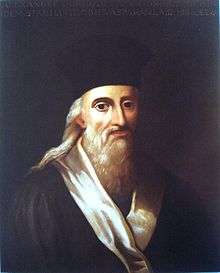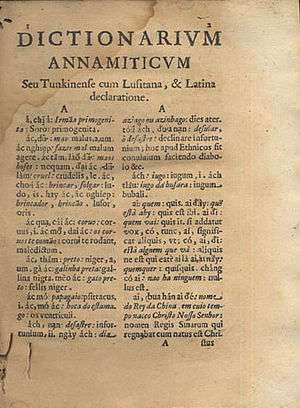Alexandre de Rhodes
Alexandre de Rhodes, S.J. (15 March 1591[1] – 5 November 1660) was an Avignonese Jesuit missionary and lexicographer who had a lasting impact on Christianity in Vietnam. He wrote the Dictionarium Annamiticum Lusitanum et Latinum, the first trilingual Vietnamese-Portuguese-Latin dictionary, published in Rome, in 1651.[2][3]
Alexandre de Rhodes | |
|---|---|
 | |
| Church | Roman Catholic Church |
| Personal details | |
| Born | 15 March 1591 Avignon, Papal States |
| Died | 5 November 1660 (aged 69) Isfahan, Persia |
| Nationality | |
| Denomination | Roman Catholicism |
Biography

Alexandre de Rhodes was born in Avignon, Papal States (now in France). According to some sources, he was a descendant of Jewish origin.[4] He entered the novitiate of the Society of Jesus in Rome on 24 April 1612 to dedicate his life to missionary work. In 1624, he was sent to the East Indies, arriving in Cochin-China on a boat with fellow Jesuit Girolamo Maiorica, and studied Vietnamese under Francisco de Pina[5]. Three years later, he started a mission in Tonkin at the request of the Jesuit superior in Macau. In 1627, he travelled to Tonkin, Vietnam where he worked until 1630, when he was forced to leave. During these three years he was in and around the Court at Hanoi during the rule of Trịnh Tùng and Trịnh Tráng. It was during that time that he composed the Ngắm Mùa Chay, a popular catholic devotion to this day, meditating upon the Passion of Christ in the Vietnamese language.[6] He was expelled from Vietnam in 1630 as Trịnh Tráng became concerned about him being a spy for the Nguyen. Rhodes in his reports said he converted more than 6,000 Vietnamese. Daily conversation in Vietnam "resembles the singing of birds", wrote Alexandre de Rhodes.
From Vietnam Rhodes went to Portuguese Macau, where he spent ten years. He then returned to Vietnam, this time to the lands of the Nguyễn Lords, mainly around Huế. He spent six years in this part until he aroused the displeasure of lord Nguyễn Phúc Lan and was condemned to death.
As his sentence was reduced to exile, Rhodes returned to Rome by 1649 and pleaded for increased funding for Catholic missions to Vietnam, telling somewhat exaggerated stories about the natural riches to be found in Vietnam. This plea by Alexandre de Rhodes is at the origin of the creation of the Paris Foreign Missions Society in 1659. As neither the Portuguese nor the Pope showed interest in the project, Alexandre de Rhodes, with Pope Alexander VII's agreement, found secular volunteers in Paris in the persons of François Pallu and Pierre Lambert de la Motte, the first members of the Paris Foreign Missions Society, who were sent to the Far-East as Apostolic vicars.[7][8][9]
Alexandre de Rhodes himself was sent to Persia instead of back to Vietnam. Rhodes died in Isfahan, Persia in 1660 and was buried in the New Julfa Armenian Cemetery.
In 1943, the French colony of Indochina issued a 30c postage stamp honoring him. In 2001 Vietnamese artist Nguyen Dinh Dang created a painting in homage to Alexandre de Rhodes and Nguyen Van Vinh.[10]
Works


While in Vietnam, de Rhodes developed an early Vietnamese alphabet based on work by earlier Portuguese missionaries such as Gaspar do Amaral, António Barbosa and Francisco de Pina. De Rhodes compiled a catechism, Phép giảng tám ngày, and a trilingual dictionary and grammar, Dictionarium Annamiticum Lusitanum et Latinum. Both published in Rome in 1651, de Rhodes's works reflect his favor of this new Latin-script alphabet instead of Nôm script.[11] Later refined as chữ Quốc ngữ, it eventually became the de facto written form of Vietnamese language in the 20th century. Meanwhile, Maiorica's catechism and devotional texts reflect the favor of chữ Nôm, which was the dominant script of Vietnamese Christian literature until the 20th century.[12]
De Rhodes also wrote several books about Vietnam and his travels there, including:
- Relazione de’ felici successi della santa fede predicata dai Padri della Compagnia di Giesu nel regno di Tunchino (Rome, 1650)
- Tunchinesis historiae libri duo, quorum altero status temporalis hujus regni, altero mirabiles evangelicae predicationis progressus referuntur: Coepta per Patres Societatis Iesu, ab anno 1627, ad annum 1646 (Lyon, 1652)
- Histoire du Royaume de Tunquin, et des grands progrès que la prédication de L’Évangile y a faits en la conversion des infidèles Depuis l’année 1627, jusques à l’année 1646 (Lyon, 1651)
- Divers voyages et missions du P. Alexandre de Rhodes en la Chine et autres royaumes de l'Orient (Paris, 1653), translated into English as Rhodes of Viet Nam: The Travels and Missions of Father Alexandre de Rhodes in China and Other Kingdoms of the Orient (1666)
- La glorieuse mort d'André, Catéchiste (The Glorious Death of Andrew, Catechist) (pub. 1653)
Notes
- Current scholarship suggests Rhodes may have been born in 1593. See Eduardo Torralba, S.I., "La Date de naissance du Père de Rhodes: 15 mars 1591, est-elle exacte?", in Bulletin de la Societé des Etudes Indochinoises, n.s. 35 (1960), 683–689, about the disagreement regarding the date of de Rhodes' birth. While some sources, including the Catholic Encyclopedia, indicate that the date was 1591, specialists such as Torralba, Peter Phan, Claude Larre, Pham Dinh Khiem, and Joseph Dehergne give the later date of 1593.
- Wörterbücher: Ein Internationales Handbuch Zur Lexikographie by Franz Josef Hausmann, p.2583
- Researches Into the Physical History of Mankind By James Cowles p.501
- https://www.academia.edu/25566838/The_First_French_in_Macao._The_Jesuit_Alexandre_de_Rhodes
- "Customs and Culture of Vietnam". Archived from the original on 2006-05-05.
- C, Phan, Peter (2015-07-31). Mission and Catechesis: Alexandre de Rhodes & Inculturation in Seventeenth-Century Vietnam. Orbis Books. ISBN 9781608334742., "Adaptations of Christian liturgy", n. 5.
- Viet Nam By Nhung Tuyet Tran, Anthony Reid p.222
- An Empire Divided by James Patrick Daughton, p.31
- Asia in the Making of Europe, p.229–230
- "The Introduction of Roman Writing Into Vietnam (The transcendental Death of Mr. Nguyen Van Vinh)".
- Sidwell P., Jenny M. The Handbook of Austroasiatic Languages. BRILL. 2014. V. 2. P. 909
- Ostrowski, Brian Eugene (2010). "The Rise of Christian Nôm Literature in Seventeenth-Century Vietnam: Fusing European Content and Local Expression". In Wilcox, Wynn (ed.). Vietnam and the West: New Approaches. Ithaca, New York: SEAP Publications, Chương trình Đông Nam Á Cornell, Đại học Cornell. pp. 23, 38. ISBN 9780877277828.CS1 maint: ref=harv (link)
Sources
- Tigers in the Rice, W. Sheldon p. 26 (1969)
- Catholic Encyclopedia entry on Alexandre de Rhodes
- Trần Duy Nhiên and Roland Jacques (2007). "Phản hồi bài viết của Gs Ts Phạm Văn Hường". Archived from the original.
- Nguyễn Đình Đầu (2007). "Về bài báo vu khống và phỉ báng cha Ðắc Lộ". Nguyệt san Công giáo và Dân tộc số 145.